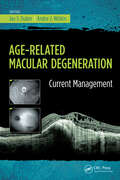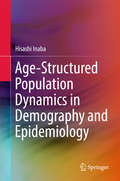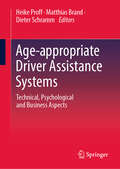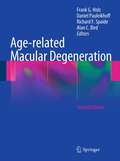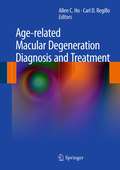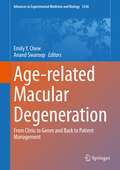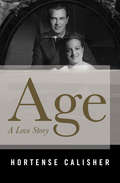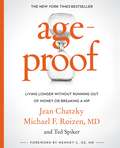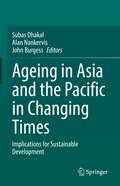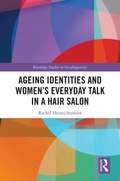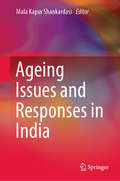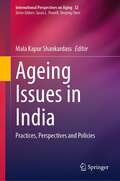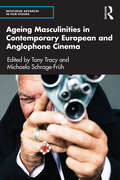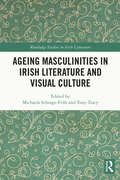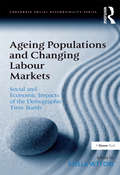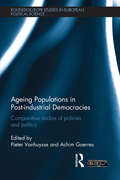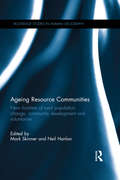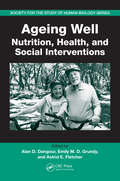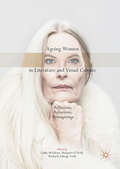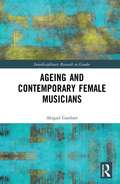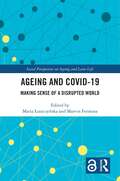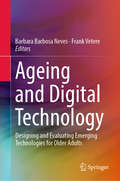- Table View
- List View
Age-Related Macular Degeneration: Current Management
by Jay Duker Andre WitkinRetinal disease in general, and age-related macular degeneration (AMD) specifically, is of major interest worldwide due to the increasing aging population and the revolution in management of wet AMD over the past several years. Age-Related Macular Degeneration presents an up-to-date, clinically relevant monograph on the current diagnosis and management of AMD.Age-Related Macular Degeneration by Drs. Jay S. Duker and Andre J. Witkin serves as a reference for ophthalmologists treating AMD in the clinic as well as other eye care professionals who see and counsel patients with AMD. Chapters will focus on the pathogenesis and risk factors for AMD, the diagnosis of AMD, treatment options, and promising investigative interventions. To help readers gain familiarity recognizing AMD, the book contains multiple images in different formats: high quality color fundus photographs, black-and-white angiograms, black-and-white autofluorence images, and both color and black-and-white OCT images.Relevant to current management of AMD, Age-Related Macular Degeneration: Current Management concentrates on “clinical utility” rather than emphasizing published studies, filling the current void in the market for the general ophthalmology and optometry audience. Comprehensive ophthalmologists, optometrists and retinal specialists will appreciate the book’s practical approach to AMD.
Age-Structured Population Dynamics in Demography and Epidemiology
by Hisashi InabaThis book is the first one in which basic demographic models are rigorously formulated by using modern age-structured population dynamics, extended to study real-world population problems. Age structure is a crucial factor in understanding population phenomena, and the essential ideas in demography and epidemiology cannot be understood without mathematical formulation; therefore, this book gives readers a robust mathematical introduction to human population studies. In the first part of the volume, classical demographic models such as the stable population model and its linear extensions, density-dependent nonlinear models, and pair-formation models are formulated by the McKendrick partial differential equation and are analyzed from a dynamical system point of view. In the second part, mathematical models for infectious diseases spreading at the population level are examined by using nonlinear differential equations and a renewal equation. Since an epidemic can be seen as a nonlinear renewal process of an infected population, this book will provide a natural unification point of view for demography and epidemiology. The well-known epidemic threshold principle is formulated by the basic reproduction number, which is also a most important key index in demography. The author develops a universal theory of the basic reproduction number in heterogeneous environments. By introducing the host age structure, epidemic models are developed into more realistic demographic formulations, which are essentially needed to attack urgent epidemiological control problems in the real world.
Age-appropriate Driver Assistance Systems: Technical, Psychological and Business Aspects
by Dieter Schramm Heike Proff Matthias BrandPeople in highly developed countries are getting older and older. They want to be mobile in old age, but often have problems in road traffic. Even though they often pay a premium for age-appropriate products that increase safety, the demand for driver assistance systems among older drivers has so far been low. This book summarises the results of the ALFASY (ALtersgerechte FAhrerassistenzSYsteme) project, in which an acoustic driver assistance system is being developed and built to meet the needs of the steadily growing group of older drivers. Technical, psychological and economic aspects were investigated.
Age-friendly Housing
by Julia Park Jeremy PorteousThis book embeds the principles of how we should approach the design of future housing for an ageing population, reminding us that this is not about ‘other people’, but about each of us. This book focuses on anticipating the needs and aspirations of the next generation of older people, and touches on what this implies for our communities, our towns and our cities, as well as for our living spaces. It will look at how well-designed buildings can facilitate the provision of care, support independence and wellbeing while providing companionship and stimulation. It will also examine how to ensure that buildings remain flexible over a long life. Dealing mainly with new-build, but with a section on adaptation and refurbishment, this book sets out the underlying design principles that should be applied and the early decisions that must be taken.
Age-less
by Fredric BrandtIn Age-less: The Definitive Guide to Botox, Collagen, Lasers, Peels, and Other Solutions for Flawless Skin, world-renowned celebrity dermatologist Dr. Fredric Brandt -- known as both the "Botox Baron" and the "King of Collagen" and acknowledged to be the largest user of both Botox and injectable collagen in the world -- shares the secrets that have made him one of the most sought-after names in skin care today. In this cutting-edge guide to the latest age-reduction techniques and strategies, Dr. Brandt helps readers demystify how to achieve the skin of their dreams and maximize their skin's potential for youthfulness. Dr. Brandt's solution to obtaining flawless skin lies in a multifaceted approach comprised of three key elements: the all-important damage prevention, an effective at-home skin care regimen using today's most active and technologically advanced ingredients, and nonsurgical cosmetic procedures appropriate for your skin and your goals. In Age-less Dr. Brandt unveils how our seemingly mysterious skin works, explains what damages and prematurely ages the skin, and advises how such damage can be prevented -- and even repaired. Furthermore, he illuminates the very latest developments in at-home skin care and dermatological procedures like acid peels, filler injections, nonburning lasers, and Botox that together will allow individuals to control how they look regardless of their chronological age. Learn all about: Why the skin behaves the way it does The essential skin care products for flawless skin The unrivaled versatility of Botox, collagen, and other new filler materials The "Botox Face-lift" Through a series of before and after photographs, Age-less illustrates the benefits, ease, and transformative power of these innovative skin treatments so that men and women alike will quickly learn how to slow down the speeding train that it is the aging process and achieve the youthful look they desire. With Age-less, the most revolutionary and comprehensive guide to rejuvenating skin, Dr. Brandt guides readers to maximum results with the minimum of time investment -- and a beautiful face at any age!
Age-related Macular Degeneration
by Richard F. Spaide Alan C. Bird Daniel Pauleikhoff Frank G. HolzAge-related macular degeneration is the most common cause for the loss of central vision beyond the age of 50 in industrial nations. Triplication of the number of affected patients is expected over the next 25 years. Especially over the last years the standard of knowledge regarding etiology, risk factors, diagnostics and therapy of this retina illness has substantially grown - this will be covered in this up-to-date multi-authored work. Apart from epidemiologically and genetically identified risk factors both the various pathophysiological aspects including the role of the complement system and clinical manifestations including OCT and angiographic characteristics are clearly represented. Furthermore, the different therapeutic approaches are presented and discussed, including proven procedures such as intravitreal anti-VEGF therapy and seeing-aid systems, in addition to the latest and upcoming methods in the area of pharmacology. The volume is well-illustrated and tables and summaries complete the presentation.
Age-related Macular Degeneration Diagnosis and Treatment
by Carl D. Regillo Allen C. HoAge-Related Macular Degeneration: Diagnosis and Treatment is written by two leading experts from Wills Eye Hospital. Covering the latest therapies and treatments developed in the last few years, this is a concise yet highly illustrated and practical text that guides the clinician through diagnosis and treatment of the leading cause of blindness in older Americans.
Age-related Macular Degeneration: From Clinic to Genes and Back to Patient Management (Advances in Experimental Medicine and Biology #1256)
by Anand Swaroop Emily Y. ChewThis edited book focuses on the recent advances in our understanding of age-related macular degeneration (AMD), combining epidemiology and clinical diagnosis, with genetics and immunological aspects as well as the role of proteostasis and mitochondria before diving into new therapies including stem cell based approaches. AMD is a leading cause of largely incurable blindness worldwide and projected to double from 2.07 million to 5.44 million individuals by 2050 in the United States. Globally, 288 million individuals are projected to have AMD by 2040. The disease has enormous socioeconomic impact on the affected individuals, their families and the society. This book will bring together the state of the art basic science knowledge with clinically relevant findings and address the challenges for future research in AMD. The intersection of different disciplines will provide potential areas for further investigations to reduce the burden of blindness from AMD. This book offers an appealing and insightful resource for clinicians, scientists, students and fellows.
Age: A Love Story
by Hortense CalisherA novel that examines aging and marriage with sincerity and insightRupert and Gemma, an elderly couple still very much in love, know that death will inevitably come for one of them before taking the other, so they keep private journals to ensure that the survivor&’s mate will never truly be gone, living on instead through his or her words. Age is the narrative of Rupert and Gemma&’s lives: their similarities, their differences, and the ways in which the two are irreversibly entwined. Each writes of life&’s mundane events—social outings, errands, a quiet night at home—that assume wistful meaning when viewed through the lens of memory.
AgeProof: Living Longer Without Running Out of Money or Breaking a Hip
by Michael F. Roizen Mehmet C. Oz Jean Chatzky Ted SpikerTwo of the world's leading experts explain the vital link between health and wealth that could add years to your life and dollars to your retirement savings.All the money in the world doesn't mean a thing if we can't get out of bed. And the healthiest body in the world won't stay that way if we're frazzled about five figures worth of debt. TODAY Show financial expert Jean Chatzky and the Cleveland Clinic's chief wellness officer Dr. Michael Roizen explain the vital connection between health and wealth--giving readers all the tactics, strategies, and know-how to live longer, healthier, more lucrative lives. The same principles that allow us to achieve a better body will allow us to do the same for our investment portfolio. For instance, physical and financial stability comes down to the same equation: Inflow versus outflow. Do we burn more calories than we ingest? Likewise, are we making more money than we spend? The authors detail scientific ways to improve our behavior so that the answers tilt in the readers' favor. They also offer ways to beat the system by automating how we do things and limiting our decisions in the face of too much food or too much debt. Chatzky and Roizen provide a plan for both financial independence and biological strength with action steps to get you there.
Ageing Asia and the Pacific in Changing Times: Implications for Sustainable Development
by John Burgess Subas Dhakal Alan NankervisThis book demonstrates that there are wide-ranging potential challenges in addressing issues associated with ageing populations in both developed and developing countries of the region. This book brings together local, national and regional perspectives on the ageing population and sustainable development nexus in selected countries in the Asia Pacific region. The countries selected in this book include a mix of developed and developing economies that all reflect strong trade, investment and migration linkages. While the Asia Pacific region is forecast to enjoy high growth in the coming decade, a recurring common policy challenge is addressing the ‘demographic time bomb’ posed by ageing populations and workforces (Montague et al., 2017). Consequently, this book focuses on strategic policies and practices of multiple stakeholders, primarily: governments, industry and education systems, together with, the range of aged care services providers – in more effectively addressing these key socio-economic challenges associated with the ageing population for sustainable development.
Ageing Identities and Women’s Everyday Talk in a Hair Salon (Routledge Studies in Sociolinguistics)
by Rachel HeinrichsmeierThe ageing of the world’s populations, particularly in Western developed countries, is a well-documented phenomenon; and despite many positive images of later life, in the media and public discourse later life is frequently depicted as a time of inevitable physical and cognitive decline. Against this background, Heinrichsmeier presents the results of her two-year sociolinguistic study examining how a group of older women of different ages negotiated their way through their own and others’ expectations of ageing and constructed different kinds of older – and other – identities for themselves. Through vivid and nuanced analysis of their chat and practices in a small village hair salon, Heinrichsmeier reveals these women’s subtle and skilful manipulation of stereotypes of ageing and the impact of the evolving talk on their identity constructions. Her study, which provides numerous short extracts of talk in both the hair salon and interview along with more detailed case studies, highlights the importance of such apparently ‘trivial’ sites – for both studying older people’s identity work and as loci for positive identity constructions and well-being in later life. This book will be of particular interest to graduate students and scholars working in sociolinguistics, discourse analysis, conversation analysis, and gerontological studies, as well as those interested in approaches integrating ethnography and language.
Ageing Issues and Responses in India
by Mala Kapur ShankardassThis book discusses emerging issues concerning ageing in India, describes the multi-layered vulnerabilities of older adults in the context of health care and caregiving, and explores social, legal and economic perspectives. It also analyses the existing policies and programmes intended to address these age-related issues and assesses the importance of preventive geriatrics towards active ageing, as well as the current scenario of institutional care for the elderly in India. Gathering fifteen chapters written by leading researchers in the fields of geriatrics, social work, anthropology, sociology, psychiatry, economics, law and mental health, the book presents the latest findings on ageing-related topics such as elderly health, family change, old age homes, age friendly environments and the role of integrative medicine. Accordingly, it offers a valuable resource for researchers, academics, practitioners and policymakers in the areas of gerontology, demography and sociology, as well as all those interested in the study of ageing populations.
Ageing Issues in India: Practices, Perspectives and Policies (International Perspectives on Aging #32)
by Mala Kapur ShankardassThis book explores various practices and policies related to ageing issues in India. It addresses ageing concerns from a theoretical and empirical viewpoint with in-depth analyses of existential dimensions of ageing. It provides deep insights into ageing in India by discussing demographics related to health and social differentials, gender concerns, retirement problems, epidemiological transition taking place in the country with rising problem of dementia and mental health problems. It consists of 23 chapters written by various established as well as upcoming scholars in the field. The authors cover a broad range of topics with regard to provisions for institutional care, geriatric practice and emerging issues of elder abuse. The book will appeal to professionals and to lay people getting interested in ageing India from a social, health, gender, economic, psychological and emotional aspects.
Ageing Masculinities in Contemporary European and Anglophone Cinema (Routledge Advances in Film Studies)
by Tony Tracy Michaela Schrage-FrühThis volume offers a unique exploration of how ageing masculinities are constructed and represented in contemporary international cinema. With chapters spanning a range of national cinemas, the primarily European focus of the book is juxtaposed with analysis of the social and cultural constructions of manhood and the "anti-ageing" impulses of male stardom in contemporary Hollywood. These themes are inflected in different ways throughout the volume, from considering how old age is not the monolithic and unified life stage with which it is often framed, to exploring issues of queerness, sexuality, and asexuality, as well as themes such as national cinema and dementia. Offering a diverse and multifaceted portrait of ageing and masculinity in contemporary cinema, this book will be of interest to scholars and students of film and screen studies, gender and masculinity studies, and cultural gerontology.
Ageing Masculinities in Irish Literature and Visual Culture (Routledge Studies in Irish Literature)
by Tony Tracy Michaela Schrage-Früh andThis book engages with ageing masculinities in Irish literature and visual culture, including fiction, drama, poetry, painting, and documentary. Exploring the shifting representations of older men from the early twentieth century to the present, the contributors analyse how a broad range of literary and visual texts construct, reinscribe, or challenge perceptions of older age. In doing so, they trace a shift from depictions of authority figures - often symbolising patriarchal dominance and oppression - to more nuanced, complex, and heterogeneous explorations of older men’s embodied subjectivities and vulnerabilities. Exploring artists and writers such as Seán Keating, J.M. Synge, Teresa Deevy, Marina Carr, Seamus Heaney, Paul Muldoon, Derek Mahon, Kate O’Brien, John Banville, Colm Tóibín, Bernard MacLaverty, Mike McCormack, Anne Griffin, and Claire Keegan, the essays in this collection attend to the symbolic as well as social significance of older men in Irish cultural expression.
Ageing Matters: European Policy Lessons from the East (Social Policy In Modern Asia Ser.)
by John DolingThe implications of population ageing have long concerned politicians, policy makers and governmental and non-governmental organizations in the welfare states of Europe. However, an ageing workforce is increasingly a matter of concern for the developed and fast-developing countries of Asia. Japan leads the field in this respect on account of the speed of its postwar economic development. But the little tigers of Hong Kong, Singapore, South Korea and Taiwan are poised to catch up, and Malaysia, though in the second tier of developing Asian economics, faces the prospect of population ageing sufficient to daunt an as yet under-prepared infrastructure for old age support. This book is the first to examine in detail the experiences and prospects of population ageing in those Asian countries with the highest GDP per capita. The authors pose the question to what extent Asia and 'old Europe' can learn from each other in terms of policy planning. The first section of the book sets out the field in terms of the demographic characteristics and policy predicaments of European and Asian countries. The second section presents case-studies of six countries: Japan, Hong Kong, Singapore, South Korea, Taiwan and Malaysia.
Ageing Populations and Changing Labour Markets: Social and Economic Impacts of the Demographic Time Bomb (Corporate Social Responsibility)
by Stella VettoriTalk of a demographic time bomb is not new. The notion first entered public consciousness some time ago, but there is a lack of clarity about what such talk is really all about. Ageing populations are seen both as a threat and an opportunity. There is concern about discrimination against older workers, at the same time as there is concern about a shortage of labour. Migration of labour from places with young populations to places with ageing populations is sometimes seen in a positive light and sometimes quite differently. With chapters reflecting different perspectives from around the world, this book constitutes a major contribution to serious, informed debate on issues that all too often have been the subject of sensationalised media treatment. Professor Stella Vettori has assembled a collection of expert writers on the social, cultural, political and economic factors that have implications both for labour markets and the well being of older people both in developed and developing countries. As a result, anyone involved with workplace and employment policy and practice, and issues of diversity and discrimination, either at a corporate or societal level, will want to read this book. Policy implications are considered and possible solutions to seemingly intractable problems are offered in a remarkable book that embraces serious academic debate and a practical focus on real issues.
Ageing Populations in Post-Industrial Democracies: Comparative Studies of Policies and Politics (Routledge/ECPR Studies in European Political Science)
by Pieter Vanhuysse Achim GoerresMost advanced democracies are currently experiencing accelerated population ageing, which fundamentally changes not just their demographic composition; it can also be expected to have far-reaching political and policy consequences. This volume brings together an expert set of scholars from Europe and North America to investigate generational politics and public policies within an approach explicitly focusing on comparative political science. This theoretically unified text examines changing electoral policy demands due to demographic ageing, and features analysis of USA, UK, Japan, Germany, Italy and all major EU countries. As the first sustained political science analysis of population ageing, this monograph examines both sides of the debate. It examines the actions of the state against the interests of a growing elderly voting bloc to safeguard fiscal viability, and looks at highly-topical responses such as pension cuts and increasing retirement age. It also examines the rise of ‘grey parties’, and asks what, if anything, makes such pensioner parties persist over time, in the first ever analysis of the emergence of pensioner parties in Europe. Ageing Populations in Post-Industrial Democracies will be of interest to students and scholars of European politics, and to those studying electoral and social policy reform. Official publication date 1st January 2012.
Ageing Resource Communities: New frontiers of rural population change, community development and voluntarism (Routledge Studies in Human Geography)
by Mark Skinner Neil HanlonThroughout the world’s hinterland regions, people are growing old in resource-dependent communities that were neither originally designed nor presently equipped to support an ageing population. This book provides cutting edge theoretical and empirical insights into the new phenomenon resource frontier ageing, to understand the diverse experiences of and responses to rural population ageing in the early 21st century. The book explores the resource hinterland as a new frontier of rural ageing and examines three central themes of rural population change, community development and voluntarism that characterize ageing resource communities. By investigating the links among these three themes, the book provides the conceptual and empirical foundations for the future agenda of rural ageing research. This timely contribution contains 15 original chapters by leading international experts from Australia, New Zealand, USA, Canada, UK, Ireland and Norway.
Ageing Well: Nutrition, Health, and Social Interventions (Society for the Study of Human Biology)
by Alan D. Dangour Astrid E. Fletcher Emily M. D. GrundyMany current public health actions and policies aimed at older people revolve around the often prevailing view that failing health is a consequence of ageing. It is now clear that it is possible to postpone or even prevent much of the age-related decline in health that was once thought inevitable. Future policies must recognise this changing paradi
Ageing Women in Literature and Visual Culture: Reflections, Refractions, Reimaginings
by Margaret O'Neill Michaela Schrage-Früh Cathy McGlynnThis timely collection engages with representations of women and ageing in literature and visual culture. Acknowledging that cultural conceptions of ageing are constructed and challenged across a variety of media and genres, the editors bring together experts in literature and visual culture to foster a dialogue across disciplines. Exploring the process of ageing in its cultural reflections, refractions and reimaginings, the contributors to Ageing Women in Literature and Visual Culture analyse how artists, writers, directors and performers challenge, and in some cases reaffirm, cultural constructions of ageing women, as well as give voice to ageing women's subjectivities. The book concludes with an afterword by Germaine Greer which suggests possible avenues for future research.
Ageing and Contemporary Female Musicians (Interdisciplinary Research in Gender)
by Abigail GardnerAgeing and Contemporary Female Musicians focuses on ageing within contemporary popular music. It argues that context, genres, memoirs, racial politics and place all contribute to how women are 'aged' in popular music. Framing contemporary female musicians as canonical grandmothers, Rude Girls, neo-Afrofuturist and memoirists settling accounts, the book gives us some respite from a decline or denial narrative and introduces a dynamism into ageing. Female rock memoirs are age-appropriate survival stories that reframe the histories of punk and independent rock music. Old age has a functional and canonical ‘place’ in the work of Shirley Collins and Calypso Rose. Janelle Monáe, Christine and the Queens and Anohni perform ‘queer’ age, specifically a kind of ‘going beyond’ both corporeal and temporal borders. Genres age, and the book introduces the idea of the time-crunch; an encounter between an embodied, represented age and a genre-age, which is, itself, produced through historicity and aesthetics. Lastly the book goes behind the scenes to draw on interviews and questionnaires with 19 women involved in the contemporary British and American popular music industry; DIY and ex-musicians, producers, music publishers, music journalists and audio engineers. Ageing and Contemporary Female Musicians is a vital intergenerational feminist viewpoint for researchers and students in gender studies, popular music, popular culture, media studies, cultural studies and ageing studies.
Ageing and Covid-19: Making Sense of a Disrupted World (Social Perspectives on Ageing and Later Life)
by Maria ŁuszczyńskaThis volume presents a range of research approaches to the exploration of ageing during a pandemic situation. One of the first collections of its kind, it offers an array of studies employing research methodologies that lend themselves to replication in similar contexts by those seeking to understand the effects of epidemics on older people. Thematically organised, it shows how to reconcile qualitative and quantitative approaches, thus rendering them complementary, bringing together studies from around the world to offer an international perspective on ageing as it relates to an unprecedented epidemiological phenomenon. As such, it will appeal to researchers in the field of gerontology, as well as sociologists of medicine and clinicians seeking to understand the disruptive effects of the recent coronavirus outbreak on later life.
Ageing and Digital Technology: Designing and Evaluating Emerging Technologies for Older Adults
by Barbara Barbosa Neves Frank VetereThis book brings together Sociologists, Computer Scientists, Applied Scientists and Engineers to explore the design, implementation and evaluation of emerging technologies for older people. It offers an innovative and comprehensive overview, not only of the rapidly developing suite of current digital technologies and platforms, but also of perennial theoretical, methodological and ethical issues. As such, it offers support for researchers and professionals who are seeking to understand and/or promote technology use among older adults. The contributions presented here offer theoretical and methodological frameworks for understanding age-based digital inequalities, participation, digital design and socio-gerontechnology. They include ethical and practical reflections on the design and evaluation of emerging technologies for older people, as well as guidelines for ethical, participatory, professional and cross-disciplinary research and practice. In addition, they feature state-of-the-art, international empirical research on communication technologies, games, assistive technology and social media. As the first truly multidisciplinary book on technology use among ageing demographics, and intended for students, researchers, applied researchers, practitioners and professionals in a variety of fields, it will provide these readers with insights, guidelines and paradigms for practice that transcend specific technologies, and lay the groundwork for future research and new directions in innovation.
